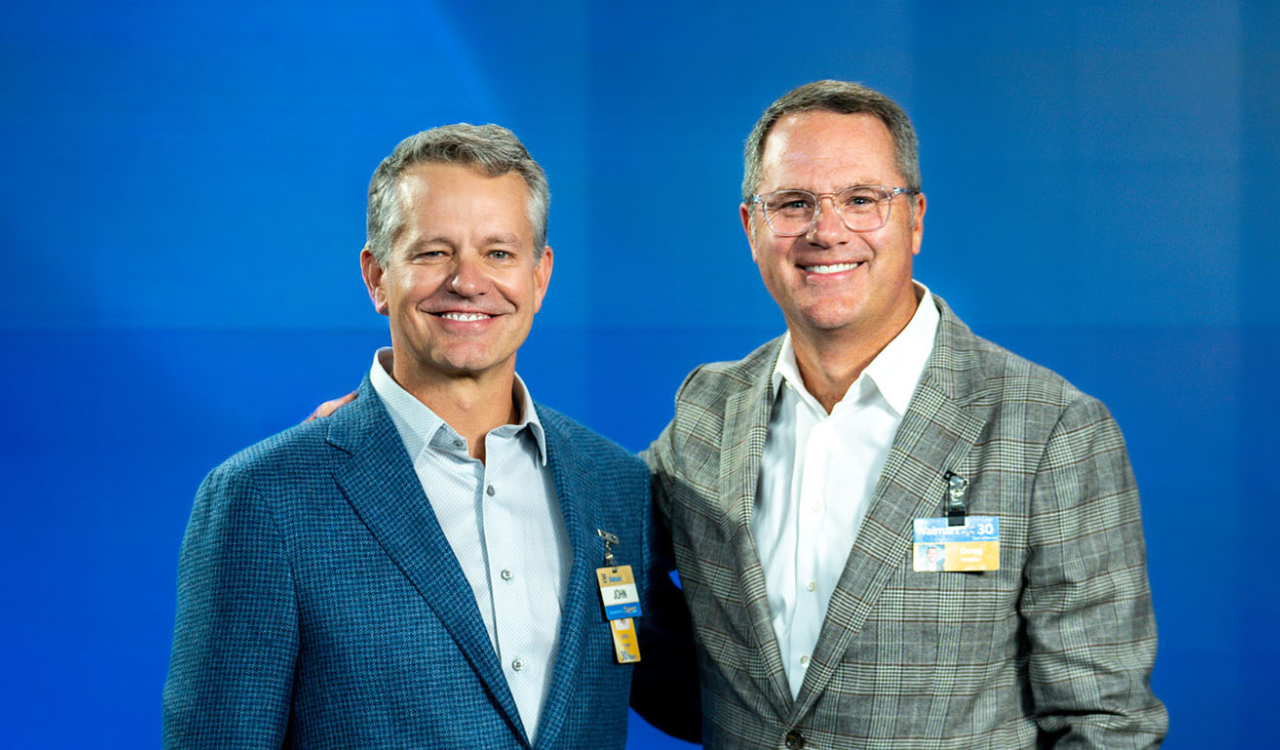Furner’s plans as the next CEO of Walmart, the world’s biggest retailer, are pretty well established.
- He needs to integrate AI into every aspect of the company’s operations, much like his predecessor did with Walmart’s digital transformation.
- He needs to close the gap with archrival Amazon in the world of ecommerce, something McMillon has made some progress on but still remains glaringly wide for the giant retailer.
- And he needs to continue to broaden the customer demographic base for Walmart as it works to take market share from more upmarket competitors like the floundering Target and the moribund department store channel.
All these initiatives are pretty obvious and within reach. Walmart has deep pockets and the ability to scale. As a company lifer with 32 years at Walmart, Furner has the home advantage and understands what makes Walmart tick—both its capabilities and its weaknesses—and he understands its customers.
You could imagine McMillon will follow a usual course of other retired executives by joining prestigious public company boards, giving speeches and perhaps writing a book. But wait, maybe there’s more.
New Horizons
Far less clear is what’s next for McMillon. All he’s said is that he will stay on the company’s board through June and then remain an advisor until January 2027. He will be a useful sounding board for his successor, unlike the former CEO mess at Target. At only 59 and with a reputation and track record that is virtually unparalleled in American business, we have to ask, “Is that really all that’s on his dance card?”
New Boss, Same Old Boss?
Though the timing caught some people off guard, the fact that John Furner got the job as the next CEO of Walmart is no surprise whatsoever. Soon to be the fifth leader of the company since its namesake founder, he neatly fits the profile of his predecessors: A long-time employee who came up through the ranks and ran various pieces of the business before getting the corner office. An Arkansas native, he joined Walmart in 1993 as a part-time store employee after attending the University of Arkansas (McMillon’s alma mater). Furner is also reported to have a close connection to the Walton family, which still controls the voting stock of the company. His most recent position was heading up the U.S. stores, which he has been doing since 2019.
While the similarities to his predecessor are numerous, a Wall Street Journal story on his appointment notes a few stylistic differences: “McMillon is known to have a gentle management touch and be somewhat conflict-averse, while Furner has a more direct style. Furner embraces new technology and ideas and sometimes ruffles feathers, according to people familiar with the situation.”
He will need that tech capability as it is number one on his to-do list. McMillon began the integration of AI into the company, and Furner will need to put that effort on steroids as technology takes hold of all aspects of American culture and business. Just recently, Walmart announced shoppers would be able to use ChatGPT to directly place orders online. That is only the first of much more comingling of the retailer and emerging tech. McMillon has said publicly that AI will “change literally every job.”
Furner’s second big challenge will be to continue to build out Walmart’s ecommerce operation. After an initial jumpstart under McMillon saw the company try out higher-end brands following a course laid out by the since-departed Marc Lore. The company then found its ecommerce cornerstone: groceries. As Amazon has struggled in this area, Walmart has been aggressively using food as the linchpin of its online strategy, especially with its ability to use its 4,600 U.S. stores as fulfillment centers.
Still, the gap with Amazon is wide—embarrassingly wide, one could say. Amazon is believed to have about 40 percent of the entire U.S. online business, while Walmart is way behind with between 6.5 and 9.6 percent, according to one industry estimate.
So, even as Walmart continues to open new physical stores and gain in-store business from faltering competitors, its true growth will have to come from ecommerce, and Furner knows that.
Membership Has Its Rewards
Embracing AI is one tool to grow its business but there is also the need to engineer the rapid delivery and expansion of its Walmart Plus membership. Right now, it’s estimated that there are 25 million members in the program. But that is way behind Amazon’s 180 million Prime members, just in the U.S. alone. That represents more than half of the country’s entire population. You might want to read that again.
Furner’s other area of opportunity will be in continuing McMillon’s steady climb up the demographic chain. Long the bastion of lower-income, disproportionately rural shoppers, Walmart has made remarkable progress moving upmarket, as evidenced by its apparel, beauty and home brands, both national and private label. In fact, largely left unreported is that Target’s slide over the past years has been as much about Walmart’s progress in attracting more affluent shoppers as it has been about Target’s self-inflicted wounds. And while Furner like his incoming CEO counterpart at Target Michael Fiddelke are both company lifers promoted from within, he is generally credited with the positives that have taken place within Walmart during his tenure while Fiddelke is often associated with Target’s failings, particularly in logistics and sourcing.
Furner takes over a well-run, financially successful and increasingly highly regarded— by shoppers and Wall Street alike—company, which is both a blessing and a possible curse. He also inherits the brand-new corporate campus that McMillon built, replacing the bargain basement headquarters complex that tarnished Walmart’s progressive, strategic image. Furner will need to keep up all the good work McMillon has accomplished while taking Walmart to the next level. It’s very doable…and equally daunting.
What’s Next for McMillon?
Doug McMillon fits the traditional age bracket for Walmart retirement (59 years), and his 12-year tenure as CEO is the longest of any of Sam Walton’s successors. The timing at the end of the calendar year before the start of the next fiscal year also fits historical patterns. But it does raise an intriguing question of what it means for him once he is uncoupled next February. Walmart says it’s nothing unusual. “Doug was ready to retire,” corporate spokesman Dan Bartlett told the Journal, “and he and the board saw that another wave of change is happening in the business and retail worlds, primarily fueled by AI. They recognized that John is uniquely capable of leading us through this period of change.”
McMillon will continue to serve on the board through next June and stay on the payroll as an advisor through January 2027. But unlike at Target, where current CEO Brian Cornell is staying on as chairman of the board, McMillon will have no direct managerial role. So, what does a 59-year-old who’s used to running the biggest company in the country with 2.1 million employees and $681 billion in annual sales do now?
He, of course, isn’t saying yet. You could imagine he will follow a usual course of other retired executives by joining prestigious public company boards, giving speeches and perhaps writing a book. But wait, maybe there’s more. The Robin Report has spoken with several well-informed individuals (left unidentified for obvious reasons), all falling under the “reliable sources” label, who have speculated that McMillon’s next job could be in public service. They said with his diplomatic skills and obvious understanding of business, he could have an influential post, either appointed or elected, probably at the federal level and perhaps even in the Trump administration. That wouldn’t be surprising, as he has been both complementary and confrontational with the president. The labor or commerce departments were hinted at as the most likely destinations. This could happen as soon as within the next six months, sources said, adding, “Doug is ready for the next step in his life.”
Happy Trails
McMillon’s predecessors at Walmart have all gradually faded into the Arkansas landscape. But retail executives going into government is not unprecedented. Herbert Kohl, former president of the Kohl Corporation, became a four-term U.S. senator. Others who ran businesses before going into politics stretch back to Warren Harding and continued through to Mike Bloomberg.
It is informed speculation, of course. But if Doug McMillon is as good a government official as he has been a retailer, the country could sure use somebody of his expertise.
In the meantime, for Furner, it’s the biggest retail transition story in the world this year…only fitting for the biggest retailer in the world.




